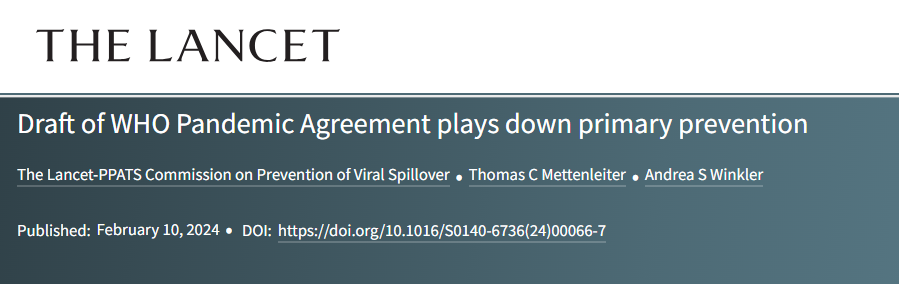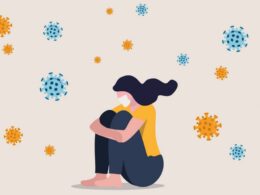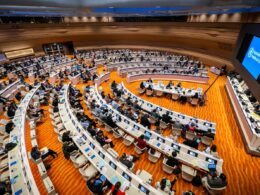health transformation institute
Joaquim Cardoso MSc
February 9, 2024
What is the message
The Lancet-PPATS Commission’s issued a critique of the draft WHO Pandemic Agreement where questions the significant oversight of primary pandemic prevention.
The Commission emphasizes the importance of taking proactive measures to prevent outbreaks from occurring in the first place, rather than solely focusing on preparedness and response after spillover events.
They highlight the need for the agreement to acknowledge and address the root causes of spillover, such as unsustainable livestock practices, wildlife trade, and environmental degradation.
Additionally, the Commission stresses the importance of a holistic One Health approach, which recognizes the interconnectedness of human, animal, and ecological health. They argue that primary prevention measures are essential components of this approach and should receive adequate attention and resourcing.
Furthermore, the Commission underscores the potential inequities in the negotiation process and outcomes of the agreement, particularly regarding the engagement of low-income and middle-income countries.
They call for concrete action from member states, especially high-income countries, to ensure successful outcomes in the negotiations and to provide meaningful funding mechanisms for implementing the agreement.
Overall, the central message is a call to prioritize primary pandemic prevention, address the root causes of spillover, ensure health equity in the negotiation process and outcomes, and take concrete steps to mitigate the risk of future pandemics.
Overall, the central message is a call to prioritize primary pandemic prevention, address the root causes of spillover, ensure health equity in the negotiation process and outcomes, and take concrete steps to mitigate the risk of future pandemics.
Key takeaways
Inadequate focus on primary pandemic prevention:
The draft of the WHO Pandemic Agreement does not adequately address primary pandemic prevention, which involves actions taken to reduce the risk of an outbreak occurring in the first place. Instead, it primarily emphasizes post-spillover secondary prevention, which involves preparedness and response after a pathogen has spilled over from animals to humans.
Lack of mention of spillover and its causes:
The draft text of the agreement barely mentions the spillover of pathogens between animals and humans, which is the origin of most recent viral pandemics. Factors contributing to spillover risk, such as livestock management practices, wildlife trade, and environmental degradation, are not adequately addressed.
Need for a holistic One Health approach:
While the draft includes language promoting a One Health approach that recognizes the interconnectedness of human, animal, and ecological health, it needs to be expanded to highlight the importance of primary prevention. This approach requires adequate resourcing, particularly from high-income countries, to address the drivers of pathogen spillover.
Health equity considerations:
The draft agreement’s stated objective of health equity is not sufficiently supported by measures for spillover prevention, which could disproportionately benefit communities at high risk of adverse outcomes from pandemics. Concerns are raised about the level of engagement by low-income and middle-income countries in the negotiation process, which could perpetuate existing inequities.
Call for concrete action:
The Lancet-PPATS Commission calls on member states, especially the Group of Twenty countries, to overcome differences and ensure successful outcomes in the negotiations.
This includes providing meaningful funding mechanisms for implementing the agreement and addressing the real and imminent threats of future pandemics, such as highly pathogenic avian influenza H5N1 virus.
Co-benefits of prevention measures:
Implementing measures to prevent spillover not only reduces the risk of future pandemics but also has important co-benefits, such as addressing climate change, biodiversity loss, equity, and animal welfare.
Implementing measures to prevent spillover not only reduces the risk of future pandemics but also has important co-benefits, such as addressing climate change, biodiversity loss, equity, and animal welfare.
DEEP DIVE

Draft of WHO Pandemic Agreement plays down primary prevention
The Lancet-PPATS Commission on Prevention of Viral Spillover
Thomas C Mettenleiter, Andrea S Winkler
Published:February 10, 2024
As scientists who are deeply engaged in reducing the risk of another pandemic, we are concerned that primary pandemic prevention — actions taken to reduce the risk of an outbreak occurring at all — gets inadequate attention in the draft text of the WHO Pandemic Agreement, released on Oct 16, 2023.1
Primary pandemic prevention (or similar concepts such as deep prevention, upstream prevention, or primordial prevention) is not once mentioned in the text. Where the term prevention is used, it often refers to post-spillover secondary pandemic prevention, which focuses on actions taken after a pathogen has spilled over from animals to humans, which is often referred to as preparedness and response.
Only four sentences in the 30-page document mention the spillover of pathogens between animals and humans, the origin of most — if not all — recent viral pandemics. We define spillover as the transmission of an infectious agent from one vertebrate species to another where it is not expected to be typically present.
The draft text includes language to promote a holistic One Health approach,2 which should be expanded to highlight the importance of primary prevention as emphasised by the Quadripartite’s One Health High-Level Expert Panel. 3
One Health recognises the inextricable interconnections between human, animal, and ecological health, and the need to address the drivers of pathogen spillover.4
Factors thought to increase spillover risk include livestock management practices associated with particular production systems; certain illegal, regulated, and unregulated wild animal trade; wild animal consumption in urban and non-urban settings (while stressing the importance of respecting traditional and Indigenous Peoples’ traditions and rights); climate change; and loss of natural ecosystems and biodiversity (mainly deforestation). 5 , 6
Effective implementation of a One Health approach requires adequate resourcing, particularly from high-income countries. Compared with the cost of containment and response following an outbreak, the relatively small annual investments needed for spillover prevention could reduce loss of life and economic disruptions caused by a potential future pandemic. 5
Such actions include financing workforce and preventive action capacity for domestic animal and wildlife health, community engagement, monitoring, environmental protection, and enhanced research and innovation on primary prevention that target the core drivers of these emergencies.
A central stated objective of the proposed Pandemic Agreement is health equity. 1
Spillover prevention protects everyone, everywhere, and might thus have especially strong benefits for communities at high risk of adverse outcomes from pandemics. Unfortunately, this is not sufficiently acknowledged in the draft agreement. In addition, the relatively low level of engagement by and with many low-income and middle-income countries compared with high-income countries in the WHO Pandemic Agreement draft negotiations raises concerns regarding the potential for perpetuating existing inequities, both through the process and in the outcomes of the negotiations.
We call on member states, especially the Group of Twenty countries, to overcome their differences and take concrete steps to ensure successful outcomes in the negotiations by rebuilding the trust lost during the COVID-19 response. This process can start with more meaningful funding mechanisms to support the agreement’s implementation. The language on finance in the draft is caveated, with no binding commitment of new resources.
The dangers of future pandemics, conceivably more harmful than COVID-19, are real and imminent. For example, highly pathogenic avian influenza H5N1 virus, which has devastated poultry industries and global wild bird populations and currently threatens numerous mammalian species, could accrue traits enabling sustained spread in humans, with high levels of mortality and social and economic disruption.7
The measures needed to reduce these threats also come with important co-benefits such as helping to address climate change, biodiversity loss, equity, and animal welfare.
TCM is co-chair of the One Health High-Level Expert Panel and chair of the advisory board to the Federal Ministry of Economic Cooperation and Development, Germany. ASW is co-chair of the Lancet One Health Commission and reports support from the German Federal Ministry of Education and Research. Members of the Lancet-PPATS Commission on Prevention of Viral Spillover and their affiliations are listed in the appendix (pp 1–2).
https://www.thelancet.com/journals/lancet/article/PIIS0140-6736(24)00066-7/fulltext












